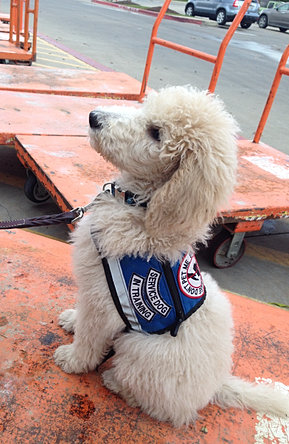Evaluating Puppy's Progress

By the time you bring your new puppy home, say at eight
weeks of age, she should already be accustomed to an
indoor domestic environment (especially one with
noises) and well-socialized with people. Similarly,
housetraining, chewtoy-training, and tutoring in basic manners
should be well underway. If not, your prospective puppy's
social and mental development is already severely at risk, and
sadly, you will be playing catch-up for the rest of her life. Your
puppy will require remedial socialization and training for a long
time to come.
Make absolutely certain your prospective puppy has been
raised indoors in close contact with people who have devoted
lots of time to her education.
If a dog is expected to live in a household with people,
obviously she needs to have been raised in a household with
people. Your puppy needs to be prepared for the clamor of
everyday domestic living: the noise of the vacuum cleaner, pots
and pans dropping in the kitchen, football games screaming on
the television, children crying, and adults arguing. Exposure to
such stimuli while her eyes and ears are still developing allows
the puppy (with her blurred vision and muffled hearing) to gradually become accustomed to sights and sounds that might
otherwise frighten her when older.
There is not much point in choosing a puppy that has been
raised in the relative social isolation of a backyard, basement,
barn, garage, or kennel, where there is precious little
opportunity for interaction with people and where a puppy has
become accustomed to soiling her living area and yapping a lot.
Puppies raised in physical seclusion and partial social isolation
are hardly prepared for household living, and they are certainly
not prepared for encounters with children or men. Backyardand
kennel-raised puppies are certainly not pet-quality dogs;
they are livestock on par with veal calves and battery hens.
Look elsewhere! Look for litters born and raised indoors—in a
kitchen or living room.
If you want a companion dog to share your home, she
obviously should have been raised in a home, not a cage.